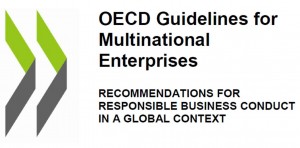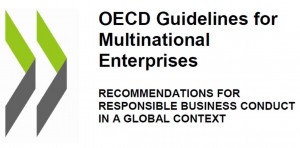Telefónica Public Policy & Telefónica España Regulatory teams
 Last week I attended the 11th Corporate Responsibility Roundtable of the OECD, which was devoted to the implementation of the OECD Guidelines for MNEs 2011. I believe that these guidelines set up an effective mechanism to monitor compliance with them across all OECD member states and will be an effective tool to achieve an improved and more responsible conduct of business and companies.
Last week I attended the 11th Corporate Responsibility Roundtable of the OECD, which was devoted to the implementation of the OECD Guidelines for MNEs 2011. I believe that these guidelines set up an effective mechanism to monitor compliance with them across all OECD member states and will be an effective tool to achieve an improved and more responsible conduct of business and companies.
The OECD Guidelines are recommendations which the governments of the OECD give jointly to multinational enterprises. They provide principles and standards of good practice consistent with applicable laws and internationally recognised standards. Observance of these Guidelines by enterprises is voluntary and not legally enforceable. The main achievements of the latest update include the incorporation of a new chapter on Human Rights (Chapter IV) and a general principle on the need to exercise due diligence to avoid or mitigate negative impacts of business operations. New inclusions also expand the companies’ responsibility of protecting Human Rights and the Environment not only to their own operations but also to their supply chains and thereby business partners.
Although the OECD Guidelines are voluntary, the companies that adopt them must comply with them in all the countries in which they operate – this avoids that companies can adopt different standards in their operations in the developing and developed world.
Overall I believe that the Guidelines are an extremely useful tool that can help businesses to define Corporate Responsibility policies. And there is one important difference between the OECD guidelines and other voluntary corporate responsibility initiatives:
The OECD guidelines include a well-defined complaint mechanism that allows any entity or individual (for example NGOs and Trade Unions) to raise concerns that a company has not met the requirements of the Guidelines. To implement that reporting system on national level, the 42 governments which have agreed the Guidelines have defined a National Contact Point (NCP) that raises awareness on national level and investigates complaints. Once a NCP has accepted a complaint as meriting further investigation, it will carry out a detailed examination and will also seek to mediate an agreement between the involved parties. Finally it will issue a concluding statement, which is not legally binding but can be made available to the public. In the case of Spain, the NCP depends of the Secretariat of State for Commerce of the Ministry of Industry, Tourism and Commerce.
In the roundtable debate NGOs criticised the absence of rules to sanction companies if they fail to comply with the OECD Guidelines. Although it is true that the guidelines do not include any rules on fines or something similar, we believe that the fact that the results of investigations of breaches of the Guidelines can (and will) be made public is a very strong sanction. It is well established that the reputation is amongst the most valuable, though intangible, properties of companies. Damage to this reputation is considered one of the biggest risks for businesses and most major companies put a focus on the management of its reputation. Reputation needs a long time to be built and can be destroyed very fast. Therefore, companies try to avoid any damage to it. A good example of how important this area has become in recent years is the new initiative of Telefónica together with other leading Spanish companies and banks to create a Think-Tank, which has the objective to do research and create new ways and ideas on the management of reputation (“Fundacion Corporate Excellence – Centre for Corporate Leadership”). See also the recent post (in Spanish) on Telefónica´s CSR Blog.
I believe therefore that companies which adopt the OECD guidelines will not risk breaching them and damaging thereby their reputation. In the case of complaints they will work together with the established NCPs and the entity or individual that has raised concerns to find a solution acceptable to all sides. This will in the end be more effective than any so-called “hard” sanction like a fine. And it will mean that the OECD Guidelines for Multinational Companies are a further step forward to create a more responsible business conduct – globally and with common international standards across all OECD member states.
Do you agree and believe that the OECD guidelines can be effective without any defined hard sanctions (e.g. fines)? Is that a good way to follow?







